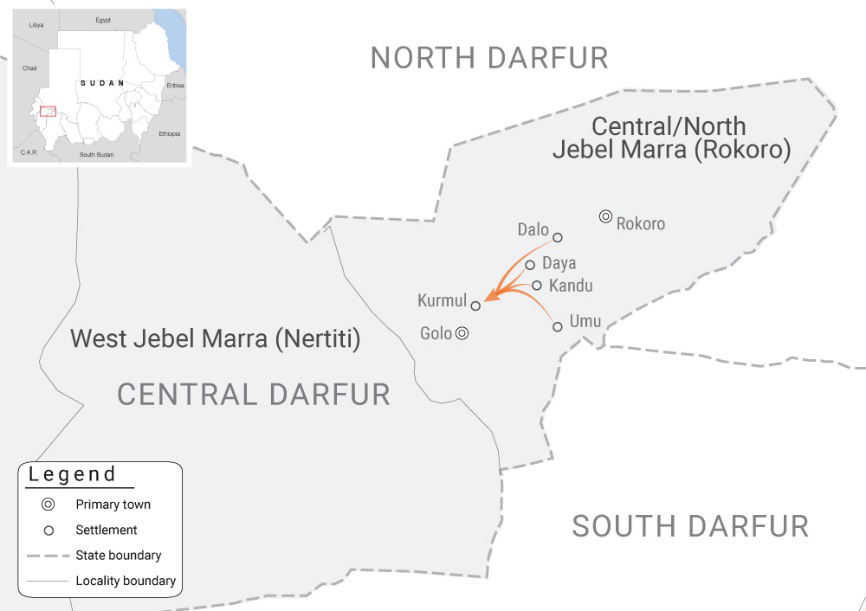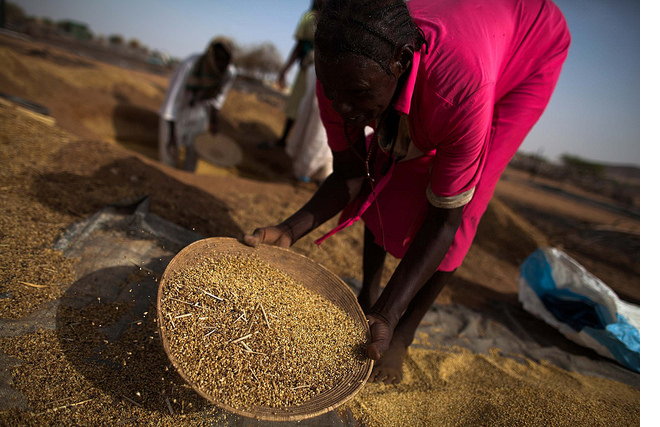Sudan OCHA bulletin 4: Nine million children vaccinated against measles and polio
The UN Office for the Coordination of Humanitarian Affairs (OCHA) in Sudan reports in its latest bulletin that a large-scale measles and polio vaccination campaign has so far reached 9.1 million children in Sudan. In Jebel Mara in Darfur, more than 2,600 people fled their homes following fighting between two rebel factions in February. An unusual high number of people arrived at South Darfur’s Otash camp from Jebel Marra between January and March of this year. A number of aid organizations and the UN-AU Mission in Darfur (Unamid) were plundered. And food insecurity in Sudan continues, despite a good harvest.

The UN Office for the Coordination of Humanitarian Affairs (OCHA) in Sudan reports in its latest bulletin that a large-scale measles and polio vaccination campaign has so far reached 9.1 million children in Sudan. In Jebel Marra in Darfur, more than 2,600 people fled their homes following fighting between two rebel factions in February. A number of aid organizations and the UN-AU Mission in Darfur (Unamid) have been plundered. Food insecurity in Sudan continues, despite a good harvest.
A large-scale measles and polio vaccination campaign -combined with a vitamin A supplement- has so far reached 9.1 million out of the 11 million children targeted. The final phase of the campaign will be carried out in Khartoum and El Gezira states on 16 June. The campaign was undertaken by the Federal Ministry of Health, the World Health Organisation (WHO), Gavi, the Vaccine Alliance, and the UN Children's Fund (Unicef). This joint polio/measles campaign is the first nationwide polio immunisation campaign since 2014.
Official statistics in Sudan indicate that measles is the third cause of mortality among infants and the first among vaccine-preventable diseases. As of March 2019, 834 measles cases were reported in the country compared to 4,980 cases reported in 2018, according to WHO.
While Sudan reported no polio cases during the past 10 years, high population immunity is still essential in the event of possible importation of the wild poliovirus or vaccine-derived poliovirus after the appearance of VDPV in Nigeria in February 2019. The risk of importation among the population of South Kordofan and Blue Nile states remains high due to the decline in immunity resulting from insecurity and conflict conditions in these areas.
More than 2,600 people flee homes in northern Jebel Marra
In Central Darfur, more than 2,600 people fled their homes in northern Jebel Marra and took refuge in Kurmul and Surragwei villages in Jebel Marra following fighting between two factions of the Sudan Liberation Movement of Abdelwahid El Nur in February.
 From 2 to 6 May, OCHA led an inter-agency assessment mission to Jebel Marra and identified about 2,200 displaced people in Kurmul and another 400 displaced in Surragwei village. These people fled 13 villages in northern Jebel Marra, including Daya, Kandu, Dalo, and Umu.
From 2 to 6 May, OCHA led an inter-agency assessment mission to Jebel Marra and identified about 2,200 displaced people in Kurmul and another 400 displaced in Surragwei village. These people fled 13 villages in northern Jebel Marra, including Daya, Kandu, Dalo, and Umu.
Their main needs are food, emergency shelter and household supplies, as well as health, water, sanitation, hygiene, protection and education assistance. The displaced who fled to mountain caves in the area are expected to come to Golo or Kurmul soon.
OCHA also reported an unusual increase in the number of displaced people who arrived in South Darfur’s Otash camp from Jebel Marra between January and March of this year. As of 26 May, an estimated 6,000 new displaced arrived in the camp during this period. This increase is unusual as there were no reports of recent conflict or violence in the area.
Premises of organisations in Darfur plundered
Criminal incidents targeting aid organisations and the AU-UN Mission in Darfur (Unamid) have been reported in Darfur. On 13 May, a group of people broke into the facilities of a number of national NGOs and an international NGO in Buram in South Darfur and stole nutrition supplies, medicine, polypropylen pipes and a generator. On 12 May, the Zakat [Muslim alms] Chamber office, a government institution, in Buram town was also plundered.
A delegation from Buram, including representatives from the Humanitarian Aid Commission (HAC), the Commission for Refugees (COR), the native administration, youth and women groups, and a member from the Alliance for Freedom and Change (AFC) visited the OCHA office to discuss the incident on 17 May. Representatives of the affected organizations also attended the meeting. The delegation apologised for the incidents and assured the organisations that better protective measures will be put in place to prevent such incidents in the future.
On 14 May, one day before Unamid’s scheduled handover of its super camp in El Geneina, West Darfur, to the government authorities, an unruly crowd forcefully entered the camp and started stealing UN property and contingent-owned-equipment, vandalised premises and put the lives of UN staff and personnel at grave risk. In a statement, Unamid condemned these acts in the strongest possible terms as they constitute a blatant violation of international norms governing the presence of UN peacekeepers across the world.
Food insecurity persists due to economic vulnerability
Despite a good 2018-2019 harvest, a high level of food insecurity persists due to economic vulnerability, according to the Comprehensive Food Security Assessment (CFSA) 2018 report recently released by WFP in collaboration with the state ministries of agriculture. The CFSA 2018 was conducted from November 2018 to February 2019 against the ongoing backdrop of economic instability. A total of 29,088 household interviews were completed in 143 localities across 13 states.
Economic vulnerability -the inability to afford food due to high prices- remains one of the major reasons behind household food insecurity, with 77 percent of the households economically vulnerable. Food insecurity is expected to remain high at least until September, which is the end of the lean season.

In the 13 states surveyed, 31 per cent of households were found food insecure, mainly due to their economic vulnerability. More than half of households were found to have spent at least 75 percent of their household expenditure on food and are unable to create or invest in livelihood assets.
About 58 percent of children between 6 – 59 months lacked diversity in their diets and 77 percent of children aged 6-23 months did not eat enough meals. Overall, only nine per cent of children aged 6-23 months met the minimum acceptable diet criteria.
Millet and sorghum prices soaring in April
Prices of Sudanese sorghum and millet increased in most markets in the country in April, according to the Food and Agriculture Organization (FAO) latest Food Prices Monitoring and Analysis (FPMA) Bulletin. By contrast, prices of wheat grain declined by 10-15 per cent in several markets, including Khartoum, following the recent harvest. Overall, prices of grains were at record or near-record levels in March despite an above-average 2018 harvest, which is estimated at 8.2 million tons, 57 per cent up from 2017 and 47 per cent above the average of the previous five years.
The exceptionally high level of prices is the result of the significant depreciation of the local currency, which continues to lose value in the parallel market, fuel shortages and soaring prices of agricultural inputs have inflated production and transport costs. Despite the good output last year, market availability is low, with traders reportedly storing their agricultural produce, regarded as a more reliable form of savings compared to the weakening currency. Political uncertainty and heightened social unrest since March exerted further inflationary pressure on prices.











 and then
and then